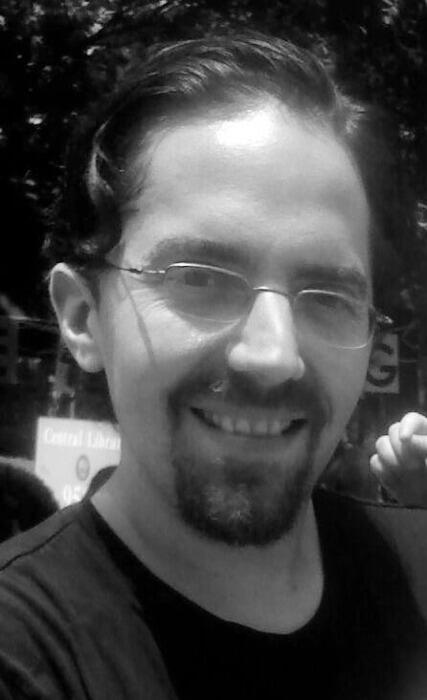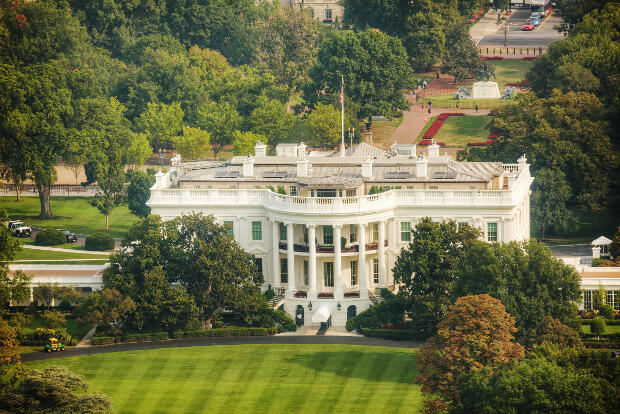May 18, 2017
Expert on leaking: We likely won’t know the full story about the Trump campaign and Russia for a long time
Jason Ross Arnold, a VCU political science professor who specializes in government secrecy, surveillance and whistleblowing, discusses Edward Snowden, WikiLeaks and the unfolding events in the White House.
Share this story
With each passing day, the news media is reporting new revelations about the Trump administration brought about by whistleblowers and leakers in the White House, the intelligence community and across the federal government.

Jason Ross Arnold, Ph.D., a professor in the Department of Political Science in the College of Humanities and Sciences, is the author of a forthcoming book on the phenomenon of whistleblowing and leaking, with the working title of “Secret-Spillers: Whistleblowers, Leakers, and Their Networks, from Snowden to Samizdat.”
Arnold — who specializes in government secrecy and transparency, surveillance, whistleblowing, political knowledge and ignorance, and other facets of information politics — is also the author of the 2014 book “Secrecy in the Sunshine Era: The Promise and Failures of U.S. Open Government Laws.” He spoke with VCU News about his books, Edward Snowden, WikiLeaks and the unfolding events in the White House.
What led you to want to write a book exploring whistleblowers and leakers?
Back in 2010 I was doing research on unrelated subjects, such as public opinion and comparative political behavior. And then, out of nowhere, came WikiLeaks. The leak site launched in 2006, but 2010 was its breakthrough year. It seemed like every few weeks it would publish large tranches of U.S. government secrets: “war logs” from Iraq and Afghanistan; videos from Army attack helicopters; and hundreds of thousands of State Department cables. I followed the news obsessively, in part because of the thorny legal and ethical issues, but also because of the developing melodrama involving Julian Assange, the eccentric WikiLeaks founder; U.S. Army Specialist Chelsea (née Bradley) Manning, the leaker; and many other quirky characters.
After a while, it seemed obvious I should write about it, given my fascination with the story and subject. That is what set into motion what would become my first book, “Secrecy in the Sunshine Era.” That book got into WikiLeaks-related matters, but it barely scratched the surface. I knew I wanted to approach the subject more directly. So I started reading and thinking about leaking and whistleblowing in a more systematic, comprehensive manner. I read, for instance, Daniel Ellsberg’s memoir about the causes and consequences of leaking the Pentagon Papers after his experiences in Vietnam and at the Defense Department. I started to compulsively build a database of all known leakers and whistleblowers around the world. I began to ask and answer the pertinent questions: What counts as “whistleblowing”? How common is it? What motivates secret-spillers? How far back in history does it go? To what extent is it a global phenomenon? That’s what led to my second book. Whereas the first book focused on the U.S., the second one has a global perspective, although the U.S. figures prominently.
You argue that we should think about whistleblower networks rather than single whistleblowers. What do you mean by that?
The typical whistleblowing/leaking story — as commonly depicted — centers around an individual within an organization who absconds with documents and then publishes them and (possibly) changes history. Think Daniel Ellsberg and the Pentagon Papers; Edward Snowden and the NSA documents; and Kathryn Bolkovac, the former United Nations worker depicted in the film “The Whistleblower.” Whether their unauthorized disclosures were justified is another matter altogether.
What becomes obvious as soon as you study each case is that other people collaborated. Sometimes lots of them. Snowden worked with a small number of journalists at first, but soon he and they quickly expanded the leaking network. The enterprise encompasses at this point hundreds of individuals and organizations. The same collaborative process characterized Ellsberg’s disclosures — along with almost all others. As soon as I recognized this simple fact and began to create network maps for Snowden and others, my project exploded — in a good way! — and I began to look around the world for these kinds of networks.
At the same time, as I considered what networks like that actually do, I realized that, strangely enough, I had been looking too intently for “whistleblowers” while looking for whistleblowers. That is, I realized that some networks do the same kind of work but are not generally recognized as leakers or whistleblowers, nor do they self-identify as such. Thus my book focuses on human rights activists in the Soviet Union who published the samizdat (underground newspaper) Chronicle of Current Events. It examines the information extraction networks of Amnesty International and other human rights organizations. It catalogues and traces the evolutionary history of online secret-spilling networks, from Anonymous to WikiLeaks and everything in between. Rare is the case of the individual secret-spiller.
Your forthcoming book examines the Snowden case in depth. What do you think about what Snowden did? On the one hand, his whistleblowing revealed fairly shocking things about U.S. surveillance and intelligence collection capabilities. But on the other, he clearly broke the law and exposed national security secrets, leading some to argue that his actions made the U.S. less safe.
My views about the Snowden case have changed over time. While I never thought his actions were unequivocally good or bad, my initial response was more positive than negative. This was partly due to the first disclosures, which revealed domestic surveillance programs and collaborations with U.S.-based corporations, which suggested a lot of unchecked mass surveillance of citizens. The first disclosure, about the phone metadata database, seemed potentially unconstitutional. I was also really caught up in the drama of Snowden hiding from the feds in Hong Kong, and then the bizarre episode of him stuck in Moscow’s airport for several weeks. It fit snugly into a Hollywood trope, with clear good guys and bad guys. His “coming out” video, broadcast with great fanfare on The Guardian webpage, presented an obviously bright, articulate, low-key, 29-year old computer whiz, who seemed deeply sincere about his commitment to America’s constitutional values.
But as I continued to pay close attention to the developments, and to scrutinize every one of Snowden’s choices along the way, I grew more and more skeptical. Almost all the Snowden disclosures have detailed foreign-focused NSA programs, which most people do not realize about the leaks. I increasingly found myself asking about the legitimacy of certain leaks — for instance, about NSA programs that intercepted Taliban emails near the Afghan-Pakistan border — and then the entire enterprise. I realized that in addition to needing to understand the specifics of the Snowden story, and the legal and ethical questions about whistleblowing more generally, I needed to intensively study intelligence — the agencies, the history, the never-ending, global spy war. All of it led me to a more nuanced position about the Snowden network. I am generally more negative than positive about it now.

Over the last few months, there have been a number of leaks related to possible ties between Trump’s campaign and Russia, such as the explosive dossier compiled by a former British intelligence officer. As someone who studies leaking and whistleblowing, what have you been thinking as you watch all this unfold?
We probably will not know the full story about the Trump campaign’s ties to Russia for a long time. What we do know is that a few individuals linked to his campaign, most notably Carter Page and Paul Manafort, had clear connections to Russian officials and interests. Page was a minor figure in the campaign, and he didn’t last very long. He also seems to be less influential in Russia than many believed. As campaign manager, Manafort had a larger role, but he was fired as soon as his connections to repressive, pro-Russian Ukrainian officials emerged. Manafort’s consulting work looks primarily and probably solely for his self-enrichment. He’s a mercenary, probably not some pro-Russian ideologue. In any case, it was appropriate for him to be fired. It was also appropriate for Trump to fire [former National Security Adviser] Gen. Michael Flynn, for multiple reasons, including his consulting work for Turkey, which violated his obligations to the Army upon retirement. His connection with Russia is not entirely clear, and we will likely learn more in the months ahead. He did apparently lie to the vice president about what he said in a December conversation with the Russian ambassador, and was summarily fired. It’s notable that the individuals in the government who illegally leaked the classified information — the unmasked NSA intercepts involving an American citizen [Flynn] — have not been identified and punished.
It seems almost certain that if more incriminating evidence involving President Trump or his associates is out there, someone will leak it. That would happen during most modern presidencies, but perhaps especially this one, given all the anti-Trumpers in the government. And if the leaked evidence shows clear abuses of public authority, then it would be justified. (In the book I spend a lot of time trying to answer this question of “when is a leak justified?”) Perhaps we will reach a turning point if Congress obtains the memo with President Trump’s alleged request to James Comey to stop the FBI’s investigation of Flynn. However, if such a document exists, it might also incriminate Comey, since he failed to report Trump’s unusual (alleged) request to the Department of Justice, as is required.
Not all of the leaks coming out of the Trump administration are dealing with major geopolitical issues. A lot of them deal with relatively mundane gossip — who is currently in Trump’s favor, who is being undermined, and other palace intrigue. Is this unusual, particularly this early in a presidential administration?
It’s common, especially in new administrations. For example, President Clinton’s early years were riven by internal conflicts. By contrast, President Obama and President Bush managed more orderly, disciplined administrations in their first years. We’ll see whether things settle down a bit in the Trump era, although he does seem to thrive on chaos.
We continue to see a steady stream of leaked CIA documents from WikiLeaks. And WikiLeaks clearly played a role in the presidential campaign, posting information from hacked emails that were damaging to Hillary Clinton, such as her speeches to Goldman Sachs. What do you think of WikiLeaks?
Overall, I once thought WikiLeaks had the potential to serve the public in a positive manner, by responsibly publishing unnecessary secrets while protecting whistleblowers via strong encryption and other methods. Perhaps an ethical secret-spilling site like that will one day arise. WikiLeaks, however, has proven itself to be incredibly irresponsible. I’ve grown closer to the thesis that it is a Russian intelligence front organization, whether witting or unwitting. It seems certainly to be a willing collaborator for Russian intelligence operations, such as the DNC hacks, as you mentioned.
I think people way overstate the influence of John Podesta’s emails on the 2016 election. It is not likely that a handful of Podesta’s embarrassing but not all that interesting emails decisively changed enough votes in key districts. Clinton’s email server scandal — a self-inflicted problem — was probably far more influential on voting behavior. The Goldman Sachs speech issue probably solidified a lot of Sanders support in the Democratic primaries, but it probably didn’t move many votes to Trump in the general election. The same goes for some of the hacked DNC emails showing a plan to sideline Sanders in favor of Clinton.
Subscribe for free to the VCU News email newsletter at http://newsletter.news.vcu.edu/ and receive a selection of stories, videos, photos, news clips and event listings in your inbox every Monday and Thursday.
Subscribe to VCU News
Subscribe to VCU News at newsletter.vcu.edu and receive a selection of stories, videos, photos, news clips and event listings in your inbox.











